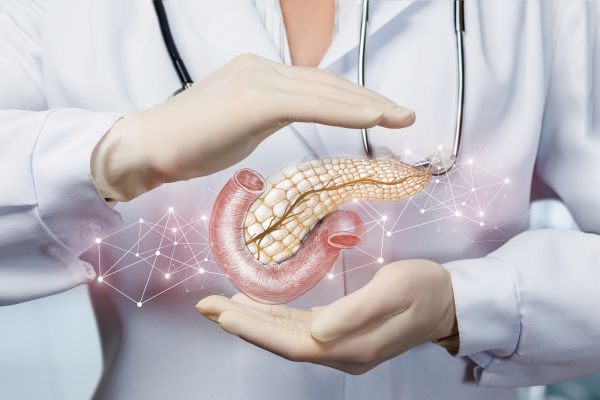Gallstones are hardened deposits, most commonly composed of cholesterol with a mix of salts and proteins that can form inside the gallbladder. Risk factors for gallstones include obesity, diabetes, pregnancy, a family history of gallstones, and some medications. Other causes of gallstones are much less common and include genetic disorders that lead to a breakdown of red blood cells and bacterial or parasite infections. Symptoms of gallstones can include sudden and worsening pain in the upper right or center of the abdomen, back pain, and nausea or vomiting. However, the majority of people who have gallstones remain unaware of the condition.
Gallstones are very common in the United States. According to a National Health and Nutrition Examination Survey, which conducted gallbladder ultrasounds on more than 14,000 people, approximately 6% of US men and 9% of US women have gallstones. The majority of patients with gallstones are asymptomatic and will continue living with them without any problems. Gallstones are often found by accident when you are being evaluated for unrelated reasons. Only about 20% of people with gallstones will become symptomatic.
"Most people with gallstones do not need their gallbladders removed. However, once someone has biliary colic (when a gallstone temporarily blocks the cystic duct), there is good reason to have a cholecystectomy (surgical removal of the gallbladder). This is done to prevent any more episodes of biliary colic and the discomfort it causes, but more importantly, to prevent what is known as complicated gallstone disease,” says Leonid Cherkassky, MD, Assistant Professor of Oncology at Roswell Park Comprehensive Cancer Center. “Once someone has any episodes of the complicated type of diseases (cholecystitis, pancreatitis, or cholangitis), the risk for another complication increases to 30 percent per year, and a cholecystectomy should be performed. This is especially true since these complications can be life-threatening."
In the United States, gallbladder cancer is rare. While most people with gallbladder cancer have gallstones, only a small fraction of people with gallstones develop gallbladder cancer. "We do not surgically remove the gallbladder just because someone has gallstones for the purposes of preventing cancer. As mentioned above, cholecystectomy is performed to prevent more symptoms and severe complications," says Dr. Cherkassky.
Gallbladder Cancer Treatment
There are several different ways to treat this rare form of cancer.
Learn MoreGallbladder cancer has symptoms that are very similar to those of gallstones. Commonly, gallbladder cancer is found after the gallbladder has been removed for what was thought to be symptoms caused by gallstones. In this case, a pathologist finds the cancer underneath the microscope when evaluating the removed gallbladder. This is called "incidental gallbladder cancer." Less often, it is evident on the ultrasound, CT scan, or MRI when these are performed to evaluate the cause of someone's pain or jaundice. "Regardless of how it is found, most gallbladder cancer cases present at advanced stages where the cancer has already spread to lymph nodes and/or other organs in the body," says Dr. Cherkassy. "Anyone with a diagnosis of gallbladder cancer should be evaluated by a multidisciplinary team, at a comprehensive cancer center like Roswell Park, which can provide access to high-volume specialty surgeons and clinical trials as well as specialists from different medical disciplines who will collaborate to plan, evaluate and deliver cancer treatment.”



